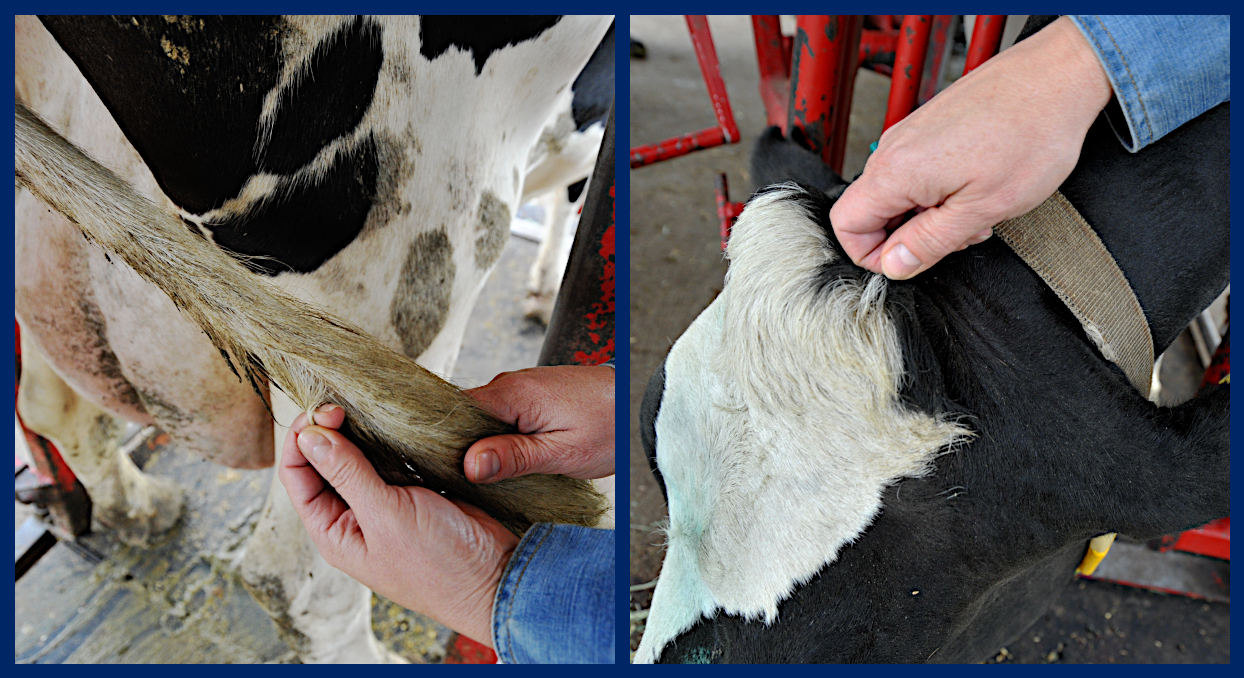Quick Summary
Click here for Price and Turnaround Time
Phenotype: Congenital pseudomyotonia (PMT) is characterized by exercise-induced muscle cramping triggered when affected animals are startled or made to move faster than a slow walk. During cramping episodes, animals present with an uncoordinated gait, sometimes hopping on their back feet. During prolonged exercise, muscles become so stiff that animals fall over and are unable to stand. Cramping episodes cease and normal movement resumes when the stimulation is stopped.
Mode of Inheritance: Autosomal recessive
Alleles: N = Normal/Unaffected, PCR = Congenital pseudomyotonia (Chianina and Romagnola), PR = Congenital pseudomyotonia (Romagnola only)
Breeds appropriate for testing: Chianina, Romagnola, BueLingo, Chianina crosses, Romagnola crosses
Explanation of Results:
- Cattle with N/N genotype will not have congenital pseudomyotonia and cannot transmit these congenital pseudomyotonia variants to their offspring.
- Cattle with N/PCR or N/PR genotype will not be affected by congenital pseudomyotonia, but are carriers of a congenital pseudomyotonia variant. They will transmit the variant they carry to 50% of their offspring. Matings between two carriers result in a 25% chance of producing a calf with congenital pseudomyotonia.
- Cattle with PCR/PCR, PR/PR, or PCR/PR genotype will have congenital pseudomyotonia, a genetic condition that impairs muscle function.
Sample Collection
Most of the cattle DNA tests offered by the VGL are carried out using cells from the roots of a hair sample (roughly 20-40 hairs).
Hair samples should be taken from the switch of the tail, the poll, or the neck.

1. Clean (use comb if possible) tail switch, poll, or neck by removing all loose hair and foreign matter.
2. Use fingers or pliers to grasp approximately 8-10 hairs close to the skin and pull. Pull (do NOT cut) hair strands. Examine the end of hair strands for presence of root bulbs. Hair roots are necessary for DNA testing. If the majority of hair strands lack the root bulbs, discard hair and start again.
3. Repeat until you have approximately 20-40 hairs with root follicles attached.
4. Place the 20-40 hairs with root follicles attached in the envelope and seal with the animal’s ID written on the envelope. If hairs are long they can be taped to the submission form. Do not tape the roots.

5. Repeat steps 1-4 for each additional animal being sampled.
Note:
- Hair should be dry.
- If hair has excess dirt and debris, please brush out if possible before pulling hairs for sample.
- Do not cut the hair! The roots contain the DNA for testing.
- When sampling several animals in the same session, make sure that there are no hair strands in your hands to reduce the possibility of sample contamination. Clean hands and/or pliers if possible.
Congenital pseudomyotonia (PMT) is a genetic defect that impairs muscle function. PMT is characterized by exercise-induced muscle cramping triggered when affected animals are startled or made to move faster than a slow walk. During cramping episodes, animals present with an uncoordinated gait, sometimes hopping on their back feet. During prolonged exercise, muscles become so stiff that animals fall over and are unable to stand. Cramping episodes cease and normal movement resumes when the stimulation is stopped. Clinical signs of PMT are present from birth and remain unchanged for life.
The abnormal muscle function in PMT cases results from mutations in the ATPase Sarcoplasmic/Endoplasmic Reticulum Ca2+ Transporting 1 (ATP2A1) gene. This gene encodes an enzyme required for calcium re-uptake by muscle cells and regulation of muscular contraction and relaxation. Three mutations have been identified in cattle that are associated with PMT. These mutations result in amino acid substitutions in the ATP2A1 enzyme that reduce its activity and affect muscle relaxation. The Arg164His mutation (PCR) is found in Chianina and Romagnola breeds. Two linked mutations, [Gly211Val; Gly284Val] (PR), were also identified in Romagnola breed.
PMT is inherited as a recessive trait in cattle. This means that 2 copies of the defective gene are needed to cause the disease. In the Romagnola breed, the 2 defective genes can be of the same mutation (PCR/PCR or PR/PR), or a combination of 2 mutations (PCR/PR). Males and females are equally affected.
Testing for PMT in Chianina and Romagnola breeds helps breeders determine if a PMT mutation is present among breeding stock and implement mating strategies to reduce incidence of PMT while retaining genetic diversity and other desirable attributes of these breeds. Carriers can be safely bred to N/N mates as this type of breeding will not produce affected calves.
